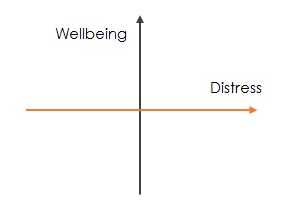How to Support the Emotional Health of Your Employees?

In recent weeks, we have heard about the harm the pandemic is causing on the psychological health of individuals. A Quebec study reported that nearly 50% of current workers suffered from some form of psychological distress just two months after the onset of the crisis.
Although the peak of the crisis has passed, the question remains - how can we take care of ourselves and others?
Emotional health is more than the absence of distress
Psychological and emotional health is often seen as a continuum defined on two axes: distress and wellbeing.

Therefore, there are two ways of intervening on it: reducing distress and increasing elements of wellbeing. For example, by drawing parallels with physical health, it is possible for an individual not to suffer from a specific disease, but to still feel weak and ill if their diet is inappropriate and they do little exercise. This is not a lack of distress but a lack of wellbeing. Similarly, individuals with chronic illnesses can spend a beautiful day being active outdoors and enjoy great weather. This is the presence of distress and wellbeing.
So, what are the equivalents for psychological health during a pandemic? Even in the context of distress (uncertainty about employment, social isolation, etc.), leaders can act on the elements of wellbeing in the workplace.
The Elements of Wellbeing at Work
There are several factors of wellbeing in the workplace that leaders can act on. The first step is to question the employee about their wellbeing at work and their needs. Employees who feel that their manager and organization care for them have a lower rate of psychological distress: "How are you doing, what do you need, what can I do to increase your wellbeing and support you?" are questions that can help. Some employees prefer to manage their emotional health in the private sphere, while others want to talk about it. Respect employees who prefer not to discuss openly. You may appear intrusive and your intention may be misperceived. If you feel that the employee is showing signs of psychological distress, please refer the employee to your EAP (Employee Assistance Program) in an empathic manner to ensure no negative connotation.
According to a study by Professor Dagenais-Desmarais, there are five dimensions to wellbeing at work:
1. Feeling of Competency at Work
Some employees may feel less competent and less efficient working from home.
As a manager, you can make sure your employees have what they need to do their job (technology, tools, information, interpersonal support, etc.). Staying flexible is also key. Recognizing and considering the individual circumstances of employees can make a difference. Some require minimal noise to be effective, while others miss the stimulation of the office environment.
2. Thriving at Work
Some companies are experiencing rapid business growth, while others are experiencing a sharp slowdown. Can your employees build on their strengths and contribute to their skills?
As a manager, you can ensure that your employees have clear goals and challenging projects to work on, despite the current turbulence.
3. Interpersonal Fit at Work
The current situation is changing the way we connect and create relationships with others.
As a manager, you want to make sure your employees can support each other, even remotely. You also want to be open and present for them if they feel the need. Be proactive in establishing (and maintaining) this relationship with them.
4. Perceived Recognition at Work
In difficult contexts, it is essential to recognize everyone's efforts and celebrate small victories.
As a manager, take a moment to recognize the hard work of your employees.
5. Desire for Involvement at Work
This is the result of the other four dimensions. When the person feels competent, supported, recognized and is given challenging goals, they will mobilize for the good of their work and the organization.
Finally, listening and responding to your own emotions and needs is vital. When we meet our own needs, we are in a better position to meet those of others.
Optimum Talent will be presenting a webinar (French) on workplace emotional health on July 8th. Register Here! To listen to the recorded English version, please visit our YouTube channel.






